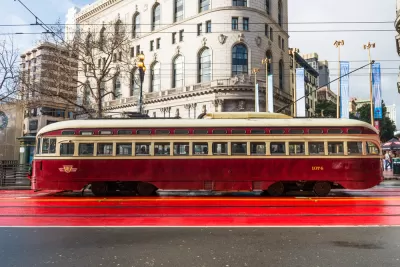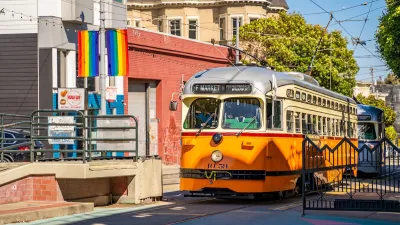The Internet of Things will continue to be a concern for cities, the ransomeware that struck the San Francisco transit system could have been much worse. A future attack will be.

Shortly after Thanksgiving, the San Francisco Municipal Transit Agency came under attack. "Someone had attacked Muni’s computer system and was demanding a ransom. Monitors in station agent booths were seen with the message, 'You Hacked. ALL data encrypted,' and the culprit allegedly demanded 100 Bitcoin (about $73,000)," Jack Stewart writes in a story for Wired.
Some riders may not even have considered that the payment machines they were using were connected to the internet, but they were. While Muni says they did not pay off the hackers, many (like this Kansas hospital) do. Like hospitals, transit systems make easy targets because, as Jack Stewart explains, "Many are aging and underfunded, with barely enough money to keep the trains running, let alone invest in IT security upgrades." This means private information about customers and employees is vulnerable.
Worse still, the problem is not just one of budgets. Connectivity is the natural consequence of a world that can do so much with internet, so more and more devices are coming online all the time and there are more and more places bad actors can take advantage of vulnerabilities. Also, digital locks, like DRM, create paths for criminals to use to break into our systems. For transit systems those devices must be accessible to the public 24 hours a day.
Stewart suggests that transit systems need to be prepared for the problem, writing, "They should create procedures for a cyber attack, then communicate, review, and update them on a regular basis." There's also work our legislators could do to make it safer to expose security risks that agencies like SFMTA and hospitals may be exposing their customers to.
FULL STORY: SF’s Transit Hack Could’ve Been Way Worse—And Cities Must Prepare

Alabama: Trump Terminates Settlements for Black Communities Harmed By Raw Sewage
Trump deemed the landmark civil rights agreement “illegal DEI and environmental justice policy.”

Study: Maui’s Plan to Convert Vacation Rentals to Long-Term Housing Could Cause Nearly $1 Billion Economic Loss
The plan would reduce visitor accommodation by 25% resulting in 1,900 jobs lost.

Planetizen Federal Action Tracker
A weekly monitor of how Trump’s orders and actions are impacting planners and planning in America.

Wind Energy on the Rise Despite Federal Policy Reversal
The Trump administration is revoking federal support for renewable energy, but demand for new projects continues unabated.

Passengers Flock to Caltrain After Electrification
The new electric trains are running faster and more reliably, leading to strong ridership growth on the Bay Area rail system.

Texas Churches Rally Behind ‘Yes in God’s Back Yard’ Legislation
Religious leaders want the state to reduce zoning regulations to streamline leasing church-owned land to housing developers.
Urban Design for Planners 1: Software Tools
This six-course series explores essential urban design concepts using open source software and equips planners with the tools they need to participate fully in the urban design process.
Planning for Universal Design
Learn the tools for implementing Universal Design in planning regulations.
Caltrans
Smith Gee Studio
Institute for Housing and Urban Development Studies (IHS)
City of Grandview
Harvard GSD Executive Education
Toledo-Lucas County Plan Commissions
Salt Lake City
NYU Wagner Graduate School of Public Service





























